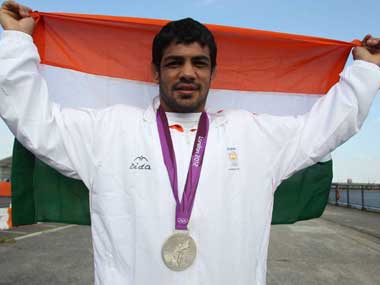London: The finale of the London Olympics had a Woodstock touch to it – and not just because of one of the bands that performed was The Who. Music was the theme and raison de etre, it seemed, for the closing ceremony, and the spectators let their hair down, sucked in by the mood of the occasion and wished for more. The bands were eclectic and across eras generations but their choice of songs made for a pastiche that would have raised some interesting questions had the event not come on the back of a hugely successful Games. But whether the closing ceremony was better than the opening would be like asking whether two silver and four bronze medals won by India here is better than one gold and two bronze medals won at Beijing, if you get what I mean. [caption id=“attachment_415634” align=“alignleft” width=“380”]  The late surge by Yogeshwar Dutt and Sushil Kumar not only made India’s Olympic quest eventful but also rewarding. PTI[/caption] However, that is being casual if not facetious for the issue is important: Has India really done 100 percent better than at Beijing? Calculating the ‘Olympic worth’ of a country can be confounding. According to the medal tally put out by the London Olympic Games Organising Committee, India is placed at number 55, but in the system used by Americans (check nbcolympics.com for instance), the ranking is a far healthier 36th. The Americans prefer the overall tally over the conventional rating system which prioritises gold medals. In a sense, this is more plausible. Consider a country winning say 20 silver and 20 bronze being upstaged in the medals tally by a country which has just a single gold! If this seems far-fetched, consider that the five countries above India in the conventional system — Algeria, Bahamas, Grenada, Uganda, Venezuela — are all ranked 50 because they’ve got one gold medal each to India’s 6-mix of silver and bronze. But there is no gainsaying that a gold medal has an impact far wider than its metal value. It suggests not just excellence at the highest level, but supremacy, over all other contestants from whichever country. Multiple golds connote greater sporting prowess, which is the aim of all major participating countries. That should be India’s aim too going ahead. Even Sushil Kumar, happy as he was at winning silver, had a tinge of regret that the gold eluded him. Overall, India’s performances in London when juxtaposed with the fairly bleak past, suggest big improvement. But on careful scrutiny they also bespeak missed opportunities and — in a few instances — massive mistakes. Most disappointing was the hockey team. While it is true that getting into the Olympics was an achievement in itself, the team players simply failed to rev up and the performances got scrappier as the tournament progressed. Archery was another discipline where India could have done much better. But some of the archers are very young and got stage fright. With this experience, they should rise to the challenge in the future. Saina Nehwal and MC Mary Kom provided cheer through the middle of the Olympics after the silver from Vijay Kumar and Gagan Narang’s bronze in the shooting. Frankly, there could have been a t least a medal more from shooting with greater diligence by the shooters, and in boxing if the scoring system was not so cock-eyed. That said, it is also true that India’s boxers seemed more intent on beating the scoring system rather than opponent: never a good strategy in contact sport. The good thing is that most boxers are barely 20 which means their best days are ahead of them. The late surge by Yogeshwar Dutt and Sushil Kumar not only made India’s Olympic quest eventful but also rewarding. But even as the celebrations for a record haul of medals grips the country, it is important to remember that this is the start, not the end of the journey.
Overall, India’s performances in London when juxtaposed with the fairly bleak past, suggest big improvement. But on careful scrutiny they also bespeak missed opportunities and — in a few instances — massive mistakes.
Advertisement
End of Article


)

)
)
)
)
)
)
)
)



